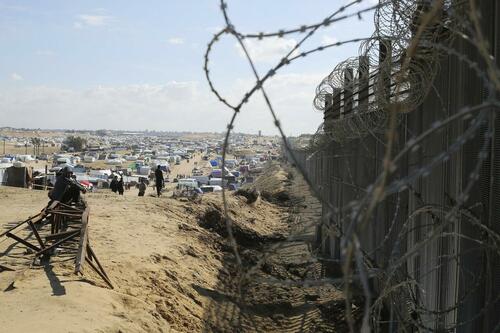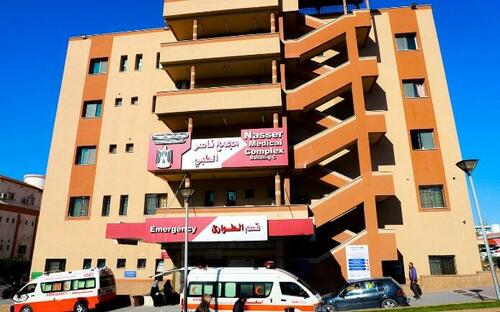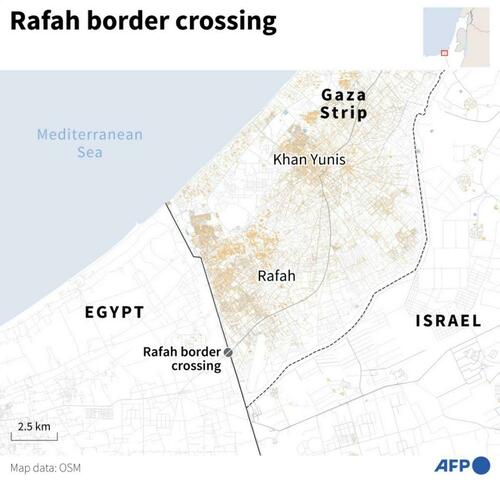Civilians have been trickling out of Gaza's southern city of Rafah, regional media has observed, as Israel's major ground assault looms, also as the city and its environs have already come under intensified shelling, air strikes, and sporadic infantry raids on some areas.
Prime Minister Netanyahu has deflected calls to halt the impending military operation by saying he's ordered the army to draw up plans to evacuate the city of its civilians prior to the invasion. While Israeli leaders say it is Hamas' "last bastion" - it has also been last bastion of safe refuge for the internally displaced of the Strip, swelling to six times the population compared to before Oct.7, according to the UN.

Currently there's an estimated 1.5 million people in Rafah, and critics of Israel's plan has said any forced displacement could be seen as part of an ongoing ethnic cleansing campaign. Earlier in the week UN's Office for the Coordination of Humanitarian Affairs (OCHA) said it would not participate in such a plan.
"We have not received any official communication from Israeli officials," Jens Laerke, spokesperson for OCHA said Tuesday. "Regardless, the UN does not participate in forced, non-voluntary evacuations. There is no plan at this time to facilitate the evacuation of civilians," he said.
International pressure has only grown, with Australia, Canada and New Zealand issuing a joint statement Thursday urging "immediate humanitarian ceasefire" and saying an assault will have a "devastating" impact on the civilian population. "There is simply nowhere else for civilians to go," the readout signed by prime ministers Anthony Albanese, Justin Trudeau and Christopher Luxon said. It stressed Israel "must listen to its friends."
Spain and Ireland also issued a letter, calling Israel's attack on Rafah "a grave and imminent threat that the international community must urgently confront."
And British Foreign Secretary David Cameron weighed in, saying Israel should "stop and think seriously" before initiating a ground invasion. He asked whether he thinks Israel has broken international law and is committing war crimes. "We think it is impossible to see how you can fight a war amongst these people. There’s nowhere for them to go," Cameron responded.
At the moment, Israeli ground forces are concentrated on a controversial mission in Khan Yunis where they've breached Nasser Hospital in an operation aimed at hostage recovery. IDF Spokesperson Rear Admiral Daniel Hagari stated Thursday, "Sadly, we know that some hostages are no longer alive. We are committed to finding and returning the bodies of those hostages in Gaza."
Additionally, "The goal of the IDF operation is to reach Hamas terrorists, including those suspected of involvement in the October 7 massacre," the IDF stated.
Thousands of people had reportedly fled the Nasser Hospital complex at Israel's urging before the assault. The Times of Israel details:
The IDF in a separate statement said that it detained several suspects at Nasser Hospital. It also added that troops were looking for Hamas terrorists at the hospital, including those who participated in the October 7 onslaught.
Gaza’s Hamas-run health ministry spokesperson Ashraf al-Qidra said Israel launched a "massive incursion" on the hospital with heavy shooting that wounded many of the displaced people who had sheltered there.
He said the military had ordered medics to move all patients into an older building that was not properly equipped for their treatment.
It's as yet unclear if any hostages, whether alive or deceased, have been found in the complex. "We conduct precise rescue operations — as we have in the past — where our intelligence indicates that the bodies of hostages may be held, Adm. Hagari described further.

Certainly, ahead of a bigger assault on Rafah, what's unfolding at the Khan Younis hospital will add to the raging controversy given the humanitarian fallout where a hospital becomes another scene of heavy fighting.
One Palestinian refugee and eyewitness identified as Jarwan told the Times of Israel that "We’re tired of fleeing from one city to another." She added: "I’m hoping the world stands with us and looks at us with a kind, merciful eye" because "We’re tired — we’re always crying. Martyrs, shelling, destruction, death, starvation, thirst, there is no food."

